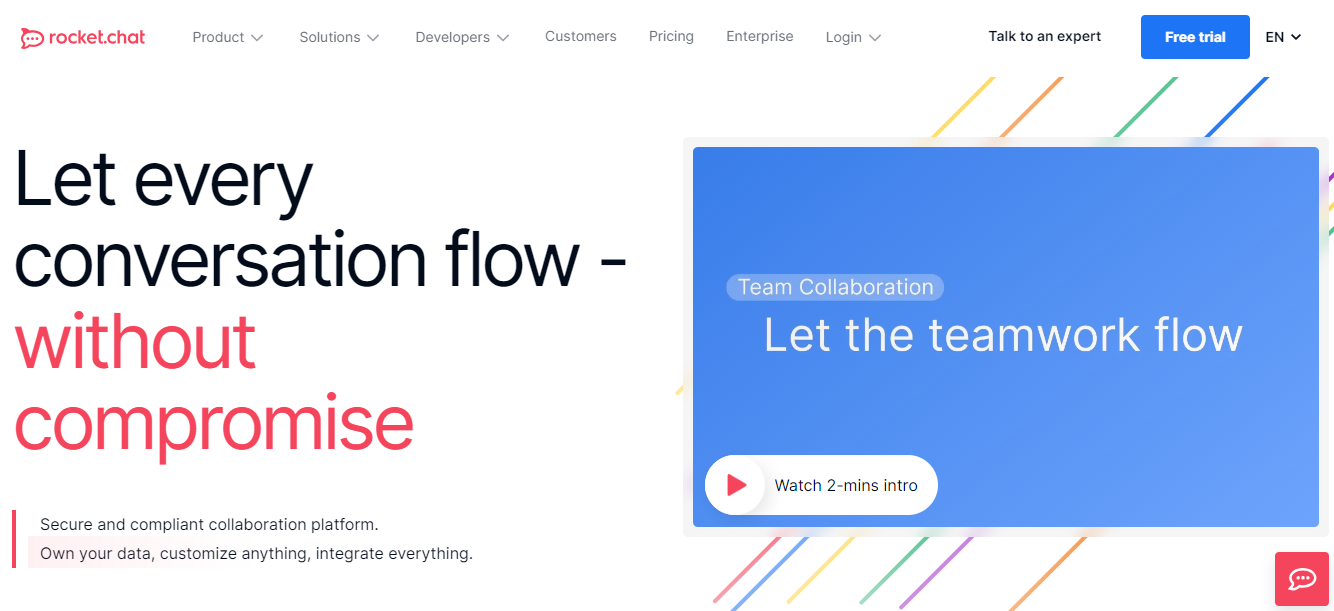Top 13 Self-Hosted Messengers for Better Team Communication
You need a self-hosted server to host your enterprise work conversations!
Indeed, self-hosted messenger the only way you bring your teams together to exchange work ideas and discuss more work.
Making your teams rely on personal chat applications at your workplace is no fun when you seriously look for productive outcomes from them you must provide self-hosting chat applications. Instead, give them the best self-hosted chat software like Troop Messenger, Flock, Rocket Chat, Mattermost, etc., to stay informed and monitor all the work routines and updates.
These days, business entities, corporates, startups, SMEs, large enterprises, etc., are bombarded with many collaboration tool options. And, most of the tools are available in the variants of SaaS and Self-Hosting.
Data is crucial for every industry, but enterprise risk management is a true high priority for large enterprises and Governments. That being said, an instant messaging solution that delivers on-premise chat is recommended for such kind of data-specific industries. Let us have a look at the following business collaboration tools that offer chat room software and safeguard the internal communication needs of these entities.
Best Self-Hosted Chat Software
1. Troop Messenger
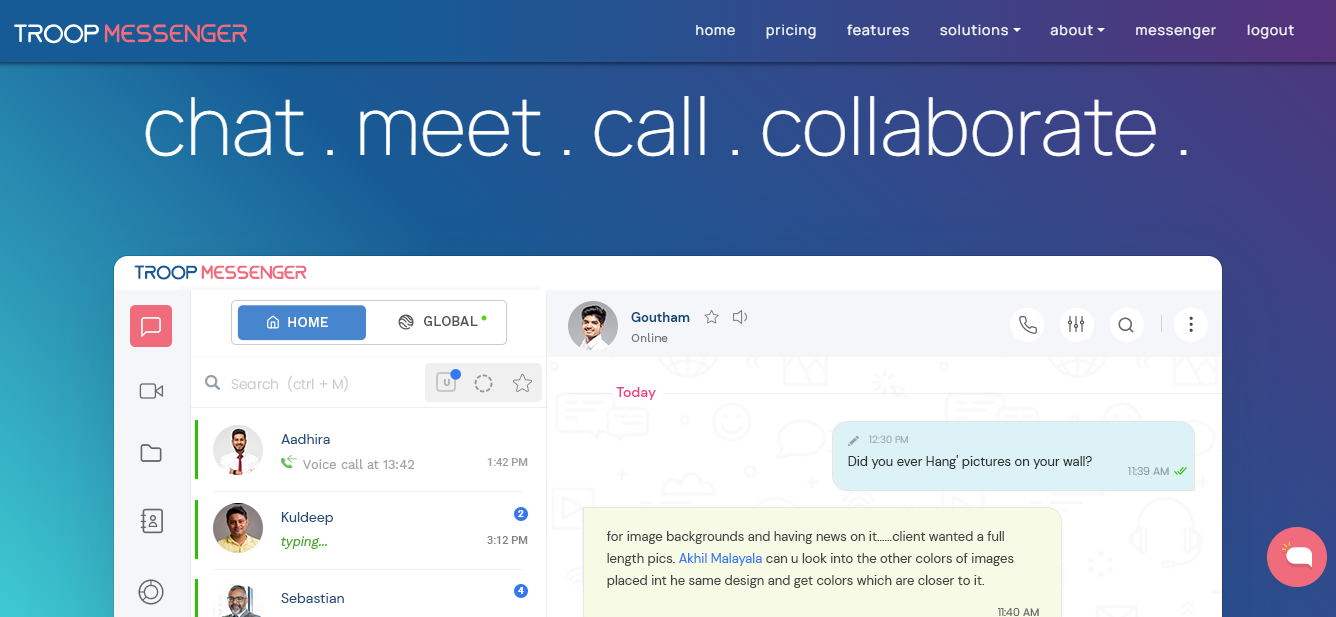
Data-sensitive and regulated industries such as Governments, Defense, Large Enterprises, Manufacturing, Pharma, etc., need a secured chat platform, unlike web-based chat software for their internal office communication to collaborate without compromising on the data they exchange. Troop GRIT is the self-hosted chat server backed up by the chat engine of Troop Messenger. This self-hosted messenger gives them 100% control of the application as they can route the conversations across their networks and databases.
You can get a customized version of hosted messaging to suit the operations of your ecosystem. As this self-hosted chat software supports Air-Gapped Networks, you can be assured of not having any third-party intrusion to access your standard or critical data.
The Deployment suite for Linux and Windows help you with detailed instruction to set it up on your on-premise servers with detailed documentation. This on-premise chat application guides you on the prerequisites for operating systems, databases, and server specifications. This self-hosting chat application will help you on; how to install docker, register, and configure SSL certificate and firewall policies.
Besides providing all the standard and productive features of SaaS, Troop Messenger, the self-managed office chat messenger, comes with Trumpet, File Deck, TM-Monitor (with Lawful Interception), UNITs, User Authorization, etc., as advanced features. End-to-end encryption, Multi-factor authentication, LDAP/SSO, and Role-Based access controls are the exclusive features for user security.
Pros
- Comprehensive File Management System-File Deck
- End-to-End Encryption
- Great customer support
- Feature-access controls
- Trial License
- Guest User-Orange Member
- Impressive UI with immersive UX
Pricing
This self-hosted chat app offers pretty affordable pricing to its clients. It starts from $5+; however, the service providers can customize it to you as per your organization's ecosystem and needs.
2. MirrorFly
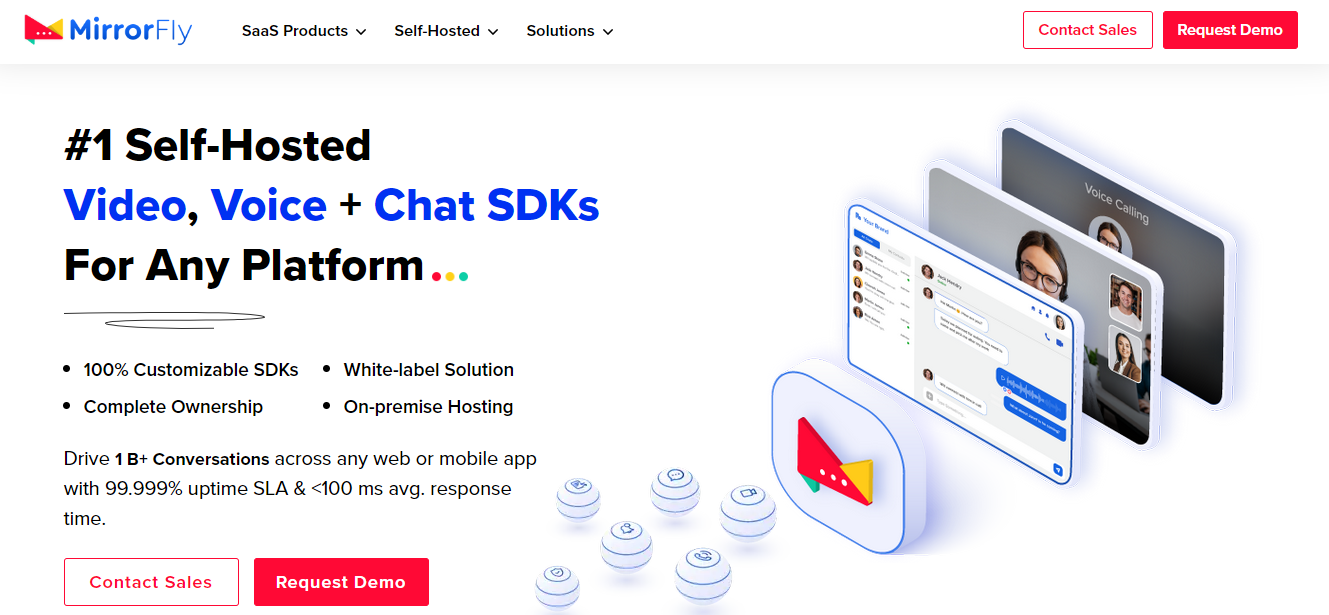
MirrorFly is an in-app communication provider that is popularly known for its feature-rich video, voice, and chat SDKs. This self-hosted chat software offers a wide range of team communication features, including real-time group chat, HQ audio, and HD video calls, file sharing, moderation, presence indicators, push notifications, and user analytics. Businesses of any scale and size can build their white-label web and mobile apps with its 150+ customizable features and deploy apps on their own premise.
When it comes to protecting user data and privacy, MirrorFly ensures that team conversations are protected end-to-end with built-in security protocols like AES-256 and SSL, along with industry-grade privacy regulations. Above this, users can flexibly deploy their apps on their own premises or on MirrorFly’s dedicated cloud servers, for maximum security, performance, and server maintenance.
Pros
- Provides fully customizable video, voice, and chat features
- MirrorFly Chat SDKs are available for a lifetime FREE access
- Offers complete white-label solution
- Let developers hire a complete dedicated team for full integration support
- Provides End-to-End security encryption
Cons
- MirrorFly currently does not support the recording of ongoing video sessions
- Do not provide options to create meeting agendas
Pricing
MirrorFly adapts a twin pricing model - SaaS and SaaP solutions, tailor-made to suit different business needs. The self-hosting solution permits users 100% customization just for a one-time license cost. On the other hand, the cloud-based pricing model comes with 3 monthly plans - Easy (completely FREE), Essentials (starting at $399), and Premium (starting at $999).
3. Wickr
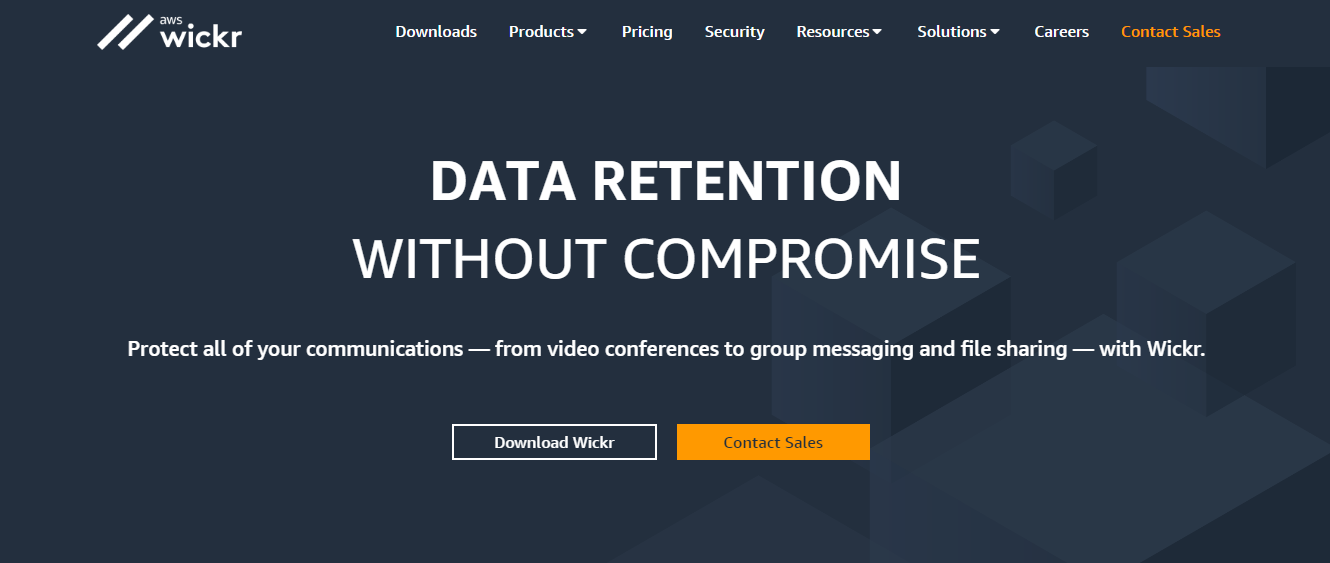
Wickr, an encrypted messaging app, has been acquired by Amazon and is now part of the Amazon Web Services-AWS team. It supports the deployment models of Federated SaaS and On-Premise. This self-hosted messenger is made to serve its customers and partners with its modern collaboration features such as messaging, voice-video calling, file sharing, and others.
Due to the Covid-19 pandemic, the rise of the hybrid work environment has skyrocketed and, the exchange of organizational data between different networks could be a big security threat. With an on-premise chat server like Wickr, all the messages, calls, and files that travel across various devices will be rightly encapsulated and secured.
Pros
- This self-hosted chat server provides the client-side E2E encryption
- Easy to set-up
- You can get started with its free plan
- Centralized messaging archived capability
Cons
- Limited features in the free plan and the paid plans seem to be expensive.
- The code is available on Github, but it’s not open-source
Pricing
Wickr offers a free plan for individuals and small teams with up to 10 registered users. The other paid plan includes Silver at $4.99/user/month, Gold at $9.99/user/month, and Platinum at $25.00/user/month.
4. Element.io
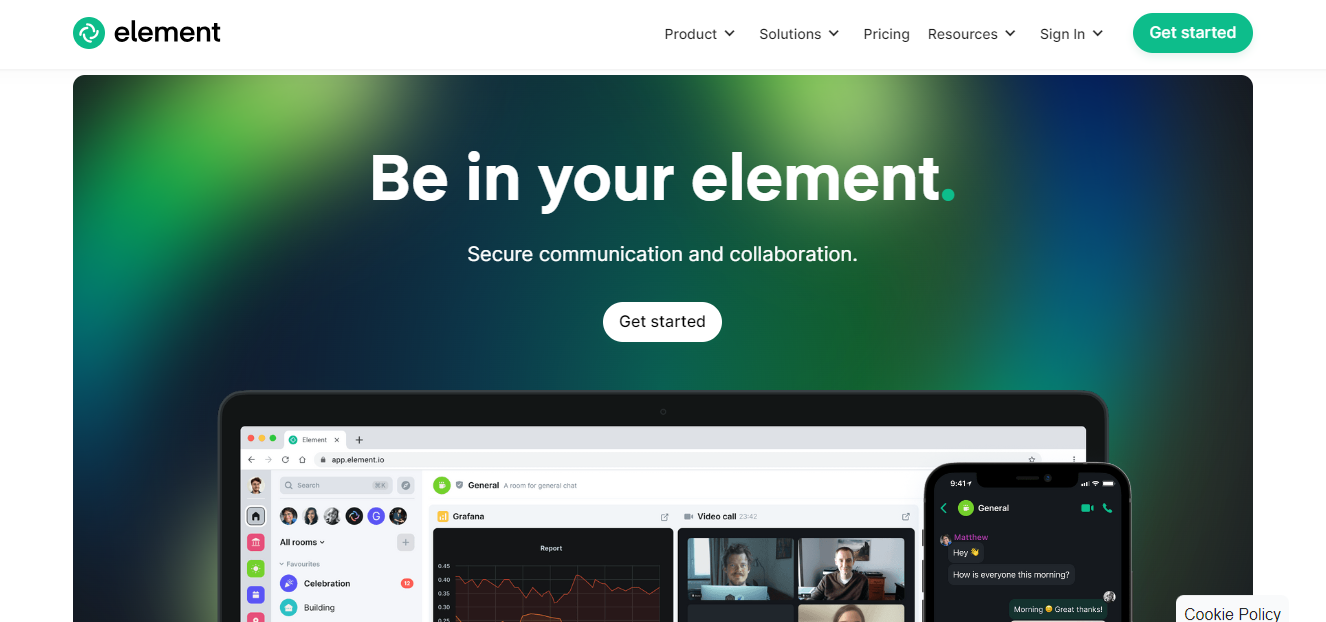
Element.io is been built on Matrix and it is considered the best open-source chat server. It offers personal messaging and enterprise collaboration to provide independent and secure communication. It allows users to bring their WhatsApp, Signal, and Telegram chats into its personal messaging variant, Element One. This open-source enterprise collaboration tool provides end-to-end encryption for your messages along with unlimited audio and video.
The primary advantage of the self-hosted messenger is, that you can be the owner of your data, which means you can store your messages on your end. Enterprises can choose between "hosted by us" in the Element cloud or on-premise deployment models to securely run their work conversations. This self-hosted chat platform provides you with different kinds of rooms, such as private, internal, and public.
Pros
- Fully managed to host with integrations and bridging facilities
- Made for personal messaging, enterprise collaboration, and communities too
- Open-source software and shares the code with everyone
- Cost-Effective
Cons
- Its desktop app from the SaaS edition should be a little more intuitive
- Occasional bugs in its mobile app, but they are manageable
Pricing
To get started with Element, the pricing model starts from $ 3 per user/per month. The other products, such as Element One and Element Enterprise are charged $5 per month for one user and $4 per monthly active user, respectively. It also helps you bridge your existing communication at $0.50 per remote monthly active user.
5. Rocket.Chat
Rocket.Chat is famously known for its open-source team communication. The two delivery models that are available with this tool are; SaaS and Self-Managed. Large Enterprises can hugely benefit from this hosted chat service as it extends high security to message exchanges with two-factor authentication, E2E encryption, SSO, and OAuth providers. An exclusive feature of real-time translation in this free chat software for businesses translates its UI to over 50 languages making users feel native. The self-managed version allows users to download the docker image and install the application on their servers.
Pros
- It has an unlimited free plan
- It supports endless customizations that include; Integrations, Plugins, Themes, and Powerful APIs
- Easy-to-implement data importers
- Scale as per your needs
- Open source group chat
Cons
- Lack of in-depth documentation
- Need better support and sales system
Pricing
Rocket Chat provides different pricing structures for Self-Managed and Cloud. For Self-Managed, it has come up with the pricing plans of Community @ Free, Pro @ $3/per user/month, and Enterprise @ Tiered pricing. The Bronze, Silver, and Gold pricing plans of the Cloud/SaaS delivery model come at $2/user/month, $4/user/month, and tiered pricing respectively.
6. Mattermost
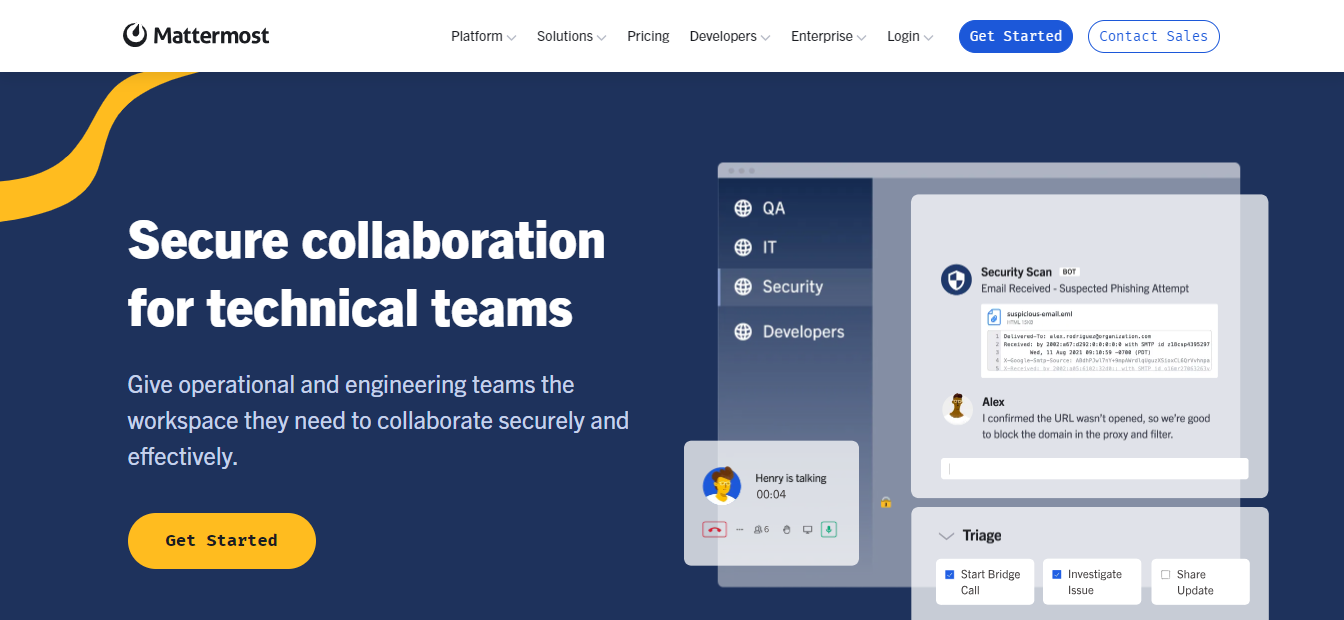
Mattermost is the best open-source chat software that introduces itself as a ‘High Trust Messaging for the Enterprise, and it is true. An exceptional self-hosted open-source messaging platform that extends secure communication across industries of all forms and sizes. This private chat software can be deployed on a private cloud within the premises of local servers. Organizations that are highly privacy-conscious believe Mattermost as their flexible partner for all internal instant communications. The tool is popular on GitHub, and it provides an extensive level of documentation that helps in docker installation.
Pros
- Build custom workflows
- Enables Dev Ops workflows
- Enterprise-grade scalability and security
- Supports Migration
Cons
- Tedious deployment process
- No in-app voice-video call feature. Need to integrate.
Pricing
Mattermost comes with two delivery models; cloud and self-hosted. Large Enterprises who are looking for self-hosting can go with a server download that supports both Linux Install and Docker installation. Moving forward, it extends the free 30-day trial of Enterprise Edition(E20). And, the other plans E10 and E20 are priced at $3.25 per user/month and $8.50 per user/month when billed annually.
7. Zulip
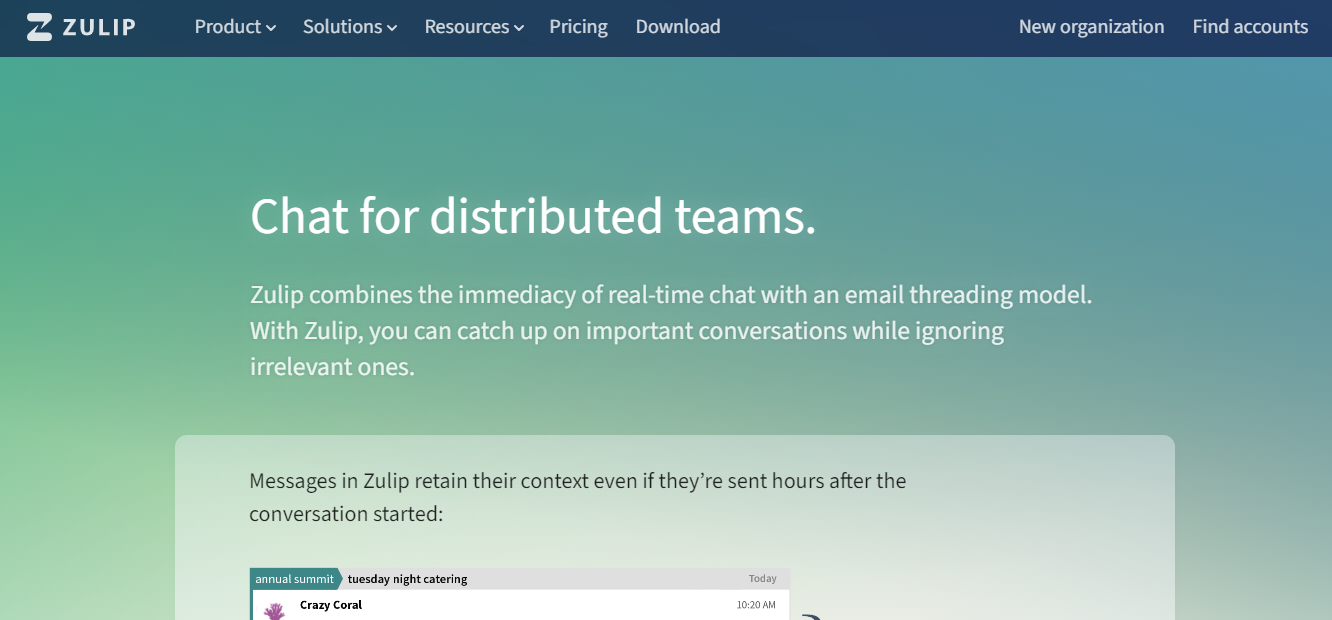
Catching up on only important conversations and ignoring irrelevant ones, is what Zulip says. Open-source software was built by hundreds of developers across the globe. The self-hosted delivery model specifically designed for Large Entities provides an excellent production installation guide that lets users deploy it on their networks. Besides its 90 native integrations, this self-hosted corporate messenger supports more integrations from Hubot, Zapier, and IFTTT. This self-hosted chat app provides excellent user documentation ranging from product installation guides to stream management.
Pros
- It has high-quality developer-friendly code.
- Build your integrations with its APIs
- Unique threading approach
- Open-source team chat
- Supports migration
Cons
- Steep learning curve
- Minimalistic features
Pricing
Zulip Cloud and Zulip On-Premise are two different pricing models that it offers. The former comes with Free and Standard Plans at unlimited and $6.67/user/month respectively, and the latter comes with the plans of Community Support as Free and Open source forever. The Enterprise pricing variant of the same varies with the support required. Users need to contact their sales team.
8. Matrix.org
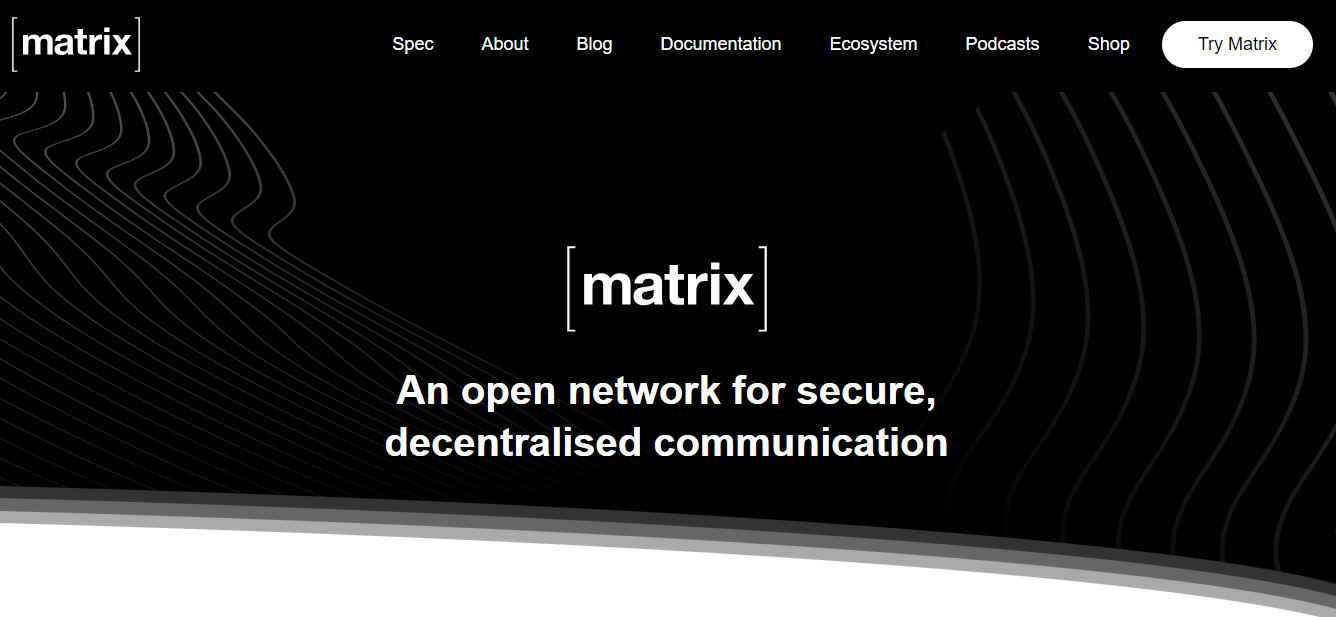
Besides a messaging protocol, Matrix is known as a decentralized conversation store. It replicates the sent message over all the servers where user participation is active. An exceptional self-hosted delivery model that provides strong end-to-end encryption via the Olm and Megolm cryptographic ratchets. This self-hosted instant messenger helps to build your apps, chat rooms, direct chats, and chatbots, with simple RESTful HTTP/JSON APIs.
Pros
- Each server has full-level control over users' data.
- Open specification of Matrix standard
- No single point of control or failure
- Supports Bridging
Cons
- Not available on the cloud
Pricing
Matrix.org never charges. It's completely free. Its free servers are open to all for public registrations.
9. Lets Chat

Yours is a small team and want to have full-scale control over your team collaboration. Then Let's Chat is the right self-hosted tool exclusively made for small teams. It runs on Node.js and MongoDB and is deployed easily on your local servers. It supports Docker and Vagrant platform installations. This self-hosted chat server has some interesting features; private/password-protected rooms, Image embeds, transcripts/chat history, and more.
Pros
- Supports LDAP/Kerberos Authentication
- Supports BYOS (Bring your own server)
- It has multiple chat rooms
- It is Hubot-friendly
Cons
- Not available over the cloud
- It doesn’t support any integrations.
Pricing
It’s free(MIT Licensed)
10. Nextcloud
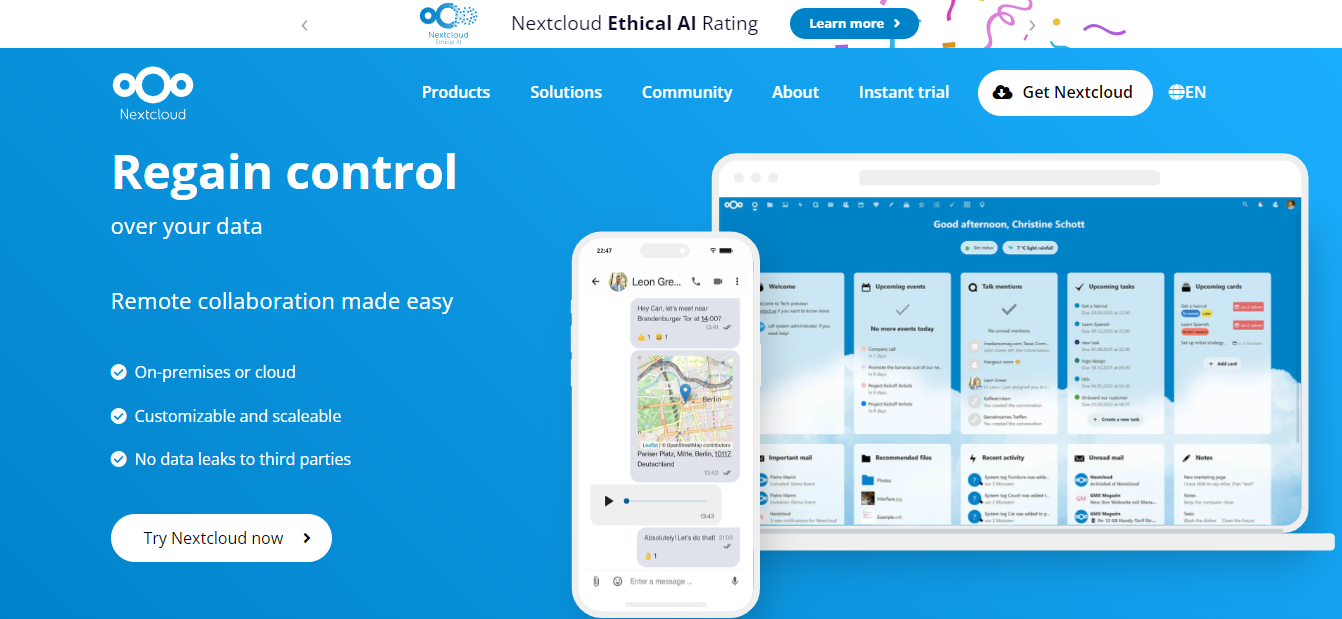
The self-hosted collaboration tool built for protecting user data through multiple layers of security offers a wide range of products like Nextcloud Files, Nextcloud Talk, Nextcloud Groupware, Nextcloud at home, and industry solutions. Nextcloud says, ‘control is key to data’. To ensure this, it implements the authentication mechanisms of SAML, Kerberos, and LDAP. It’s an open-source application with code available on GitHub for developers.
Pros
- It has two variants; Nextcloud at home and Nextcloud at Enterprise.
- Adhere to the compliances of HIPPA and GDPR
- Enterprise support
- Direct access to core Nextcloud Engineering.
Cons
- Has fewer issues with deployment on shared hosting
- No detailed manual installation guides.
Pricing
Nextcloud offers three pricing plans; Basic, Standard, and Premium. The annual pricing for Basic, Standard, and Premium for 50 users is priced at 1900 euros, 3400 euros, and 4900 euros respectively.
11. Wire
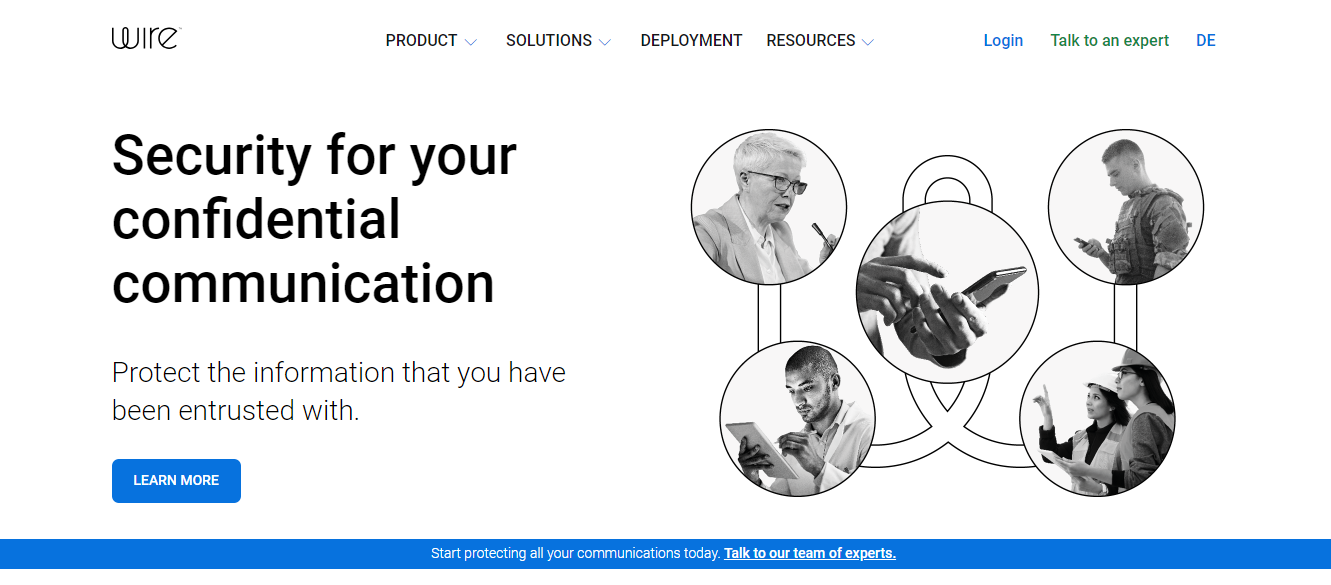
Modernize the way you collaborate, is what Wire says. It offers uncompromised end-to-end security to protect users' communication and data. Wire adheres to the compliances of ISO, CCPA, GDPR, and SOX. It allows the new users or the migrators to adopt it with different deployment options. Cloud, private, and on-premises are three deployment choices available to the users. This self-hosted instant messenger is 100% open-source and its source code is available on GitHub.
Pros
- It is independently audited
- It provides forward and backward secrecy
- Simple privacy policy
- No phone number is required, register with an email ID
Cons
- The learning curve is steep
- Occasionally slow
Pricing
The highly secured team collaboration platform comes in three pricing plans; Wire Pro, Wire Enterprise, and Wire Enterprise Technology. All three plans are charged at 4 euros per user/per month, 8 Euros per user/per month when billed biennially. The users need to contact their team to understand the Wire Enterprise Technology pricing.
12. Jitsi
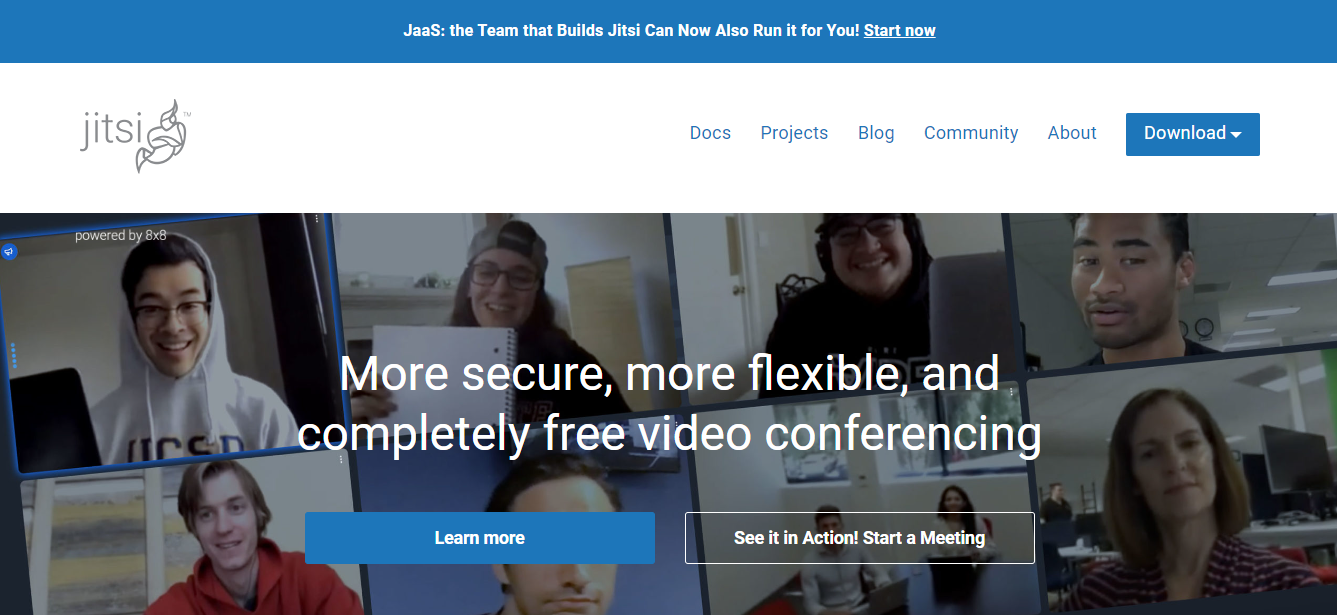
Jitsi is a 100% free multi-platform open-source video conferencing tool that looks good and sounds fantastic. Users/developers worldwide can use Jitsi or build their own apps using its tools. This self-hosted live chat has two projects; jitsi Video Bridge, and jitsi Meet. Both are open-source and WebRTC compatible which allows users to develop high-quality and scalable video conferences.
Pros
- Jitsi Desktop allows calls, chat, conferencing, file transfer, and more
- It is an open-source community
- It encodes/decodes the audio/video flows
- Recording and live streaming for Jitsi Meet
Cons
- Rare issues with the connections
Pricing
It is 100% free.
13. Tox Chat
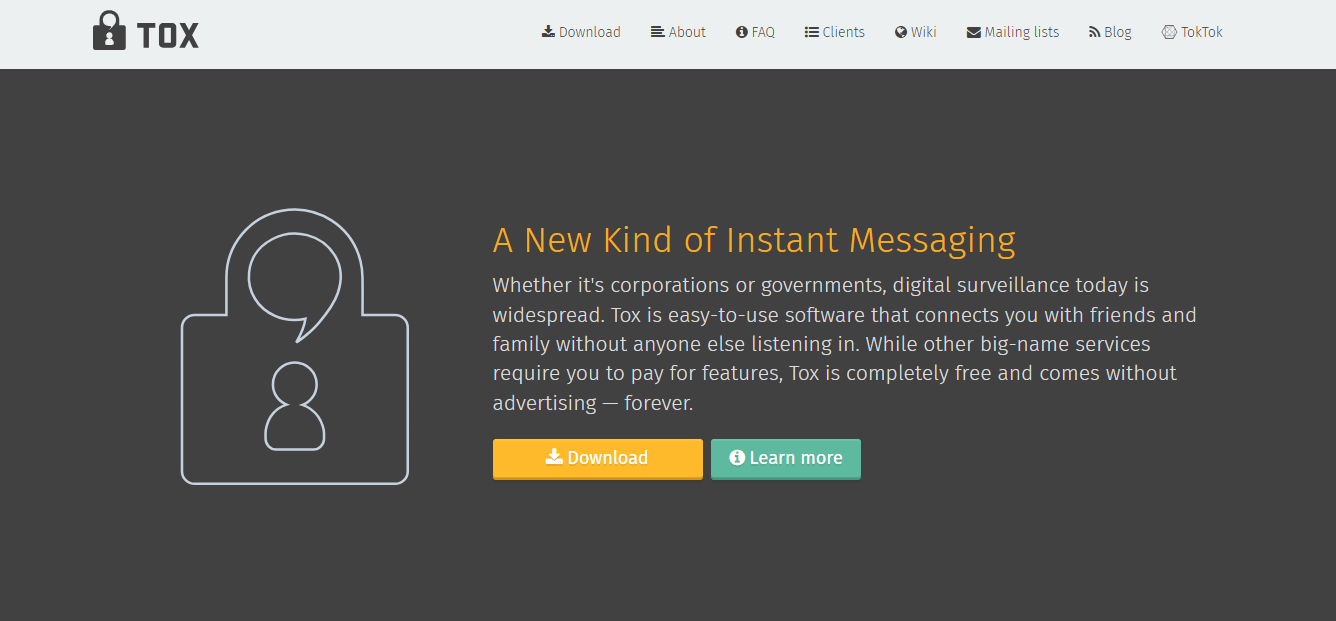
Another instant messaging application for large corporations and governments. TOX is a free, easy-to-use messaging tool that comes without advertising. It's a people-made tool, that is highly encrypted and distributed. The other features of Tox include; voice, video, screen sharing, file sharing, and groups
Pros
- A simple and secure messaging tool
- Encrypted voice calls
Cons
- Your IP is visible to others
Pricing
No corporate interests and no hidden agendas, it's free.
Conclusion
At the end of the day, it is all about how you safeguard your organization's data. Choose a highly secured on-premise collaboration tool that has no access to any third-party vendors.
These platforms offer various features and customization options, allowing businesses to choose the best solution for secure, self-hosted team communication. Whether you’re a small team or a large enterprise, these options provide control over your internal communication while ensuring the highest levels of security. Self-hosted instant messaging apps, such as Troop Messenger and other secure team messaging platforms, ensure that businesses maintain data privacy and comply with industry-specific regulations. With the flexibility to adapt to your team's unique needs, these platforms enable efficient communication while safeguarding sensitive information. A self-hosted chat server provides businesses with full control over their communication infrastructure, making it the best self-hosted chat server solution for data security. Choosing a self-hosted chat app allows companies to tailor their chat self-hosted systems to their specific needs, ensuring robust communication while protecting sensitive data.
FAQs
1. What is a self hosted chat server?
A self-hosted chat server is a messaging platform hosted on a business's private servers, giving organizations complete control over their data and communications infrastructure.
2. Self-Hosted Messengers for Better Team Communication?
Self-hosted messengers like Troop Messenger, Mattermost, and Rocket.Chat offer secure communication, full data control, and customizability, making them ideal for team collaboration.
3. What are the advantages of using a self hosted chat server?
Key advantages include enhanced security, full data ownership, compliance with regulations, customizability, and scalability for businesses of all sizes.
4. Can anyone set up and use a self hosted chat server?
While technically possible for anyone with basic IT knowledge, setting up a self-hosted chat server may require expertise in server configuration, hosting, and maintenance.
5. Can a self hosted chat server be customized to fit my needs?
Yes, most self-hosted chat servers are highly customizable, allowing businesses to tailor features, branding, and functionality to meet their specific requirements.
